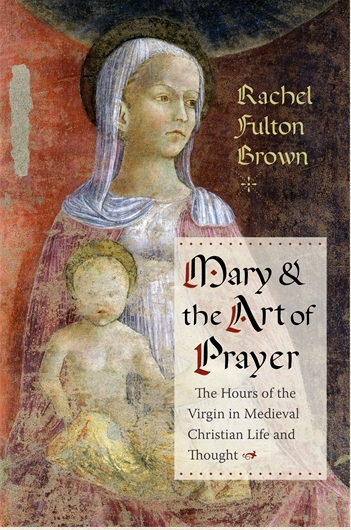Would you like to learn to pray like a medieval Christian?
This book is intended as a kind of handbook showing the way medieval Christians prayed to Mary, the Virgin Mother of God.
 Its subject-matter is the complex of psalms, chants, and other prayers known as the Hours of the Virgin with which Christians in medieval Europe served Mary, the Mother of the One whom they recognized as the Lord worshipped in the psalms of the Old Testament.
Its subject-matter is the complex of psalms, chants, and other prayers known as the Hours of the Virgin with which Christians in medieval Europe served Mary, the Mother of the One whom they recognized as the Lord worshipped in the psalms of the Old Testament.
Its purpose is to provide a history of this service, while at the same time suggesting what it would have been like for medieval Christians to imagine Mary in this way.
It is intended to be useful to students of history, devotion, prayer, theology, liturgy, and exegesis who are interested in not only the structures of medieval religious thought but also its experience as an exercise of affect, intellect, and imagination.
Its author writes as an historian and believing Christian, but she is not a theologian, although she would argue that in writing about the history of devotion to Mary it is impossible not to make certain theological claims, as even the claim that the Scriptures “say very little about Mary” with which most modern histories of devotion to Mary typically begin is itself grounded in particular confessional convictions.
The book's manner or method of treating its subject is expected to be somewhat challenging, crossing as it does the boundaries that modern scholars typically place between observation and experience, between the Primary World of provable “facts” and the Secondary World of imagination or “faërie.” Accordingly, following an introduction to the history of the devotion of saying the Hours or “Little Office” of the Virgin in chapter 1, it then invites its readers in subsequent chapters to imagine themselves as medieval Christians saying this Office, including its invitatory (chapter 2), its antiphons and psalms (chapter 3), its lessons (chapter 4), and prayers (chapter 5).
It is the author's hope that this exercise will prove intellectually stimulating as well as enjoyable, even if, as with all real adventures, it may feel dangerous at times.
Order here.
 Its subject-matter is the complex of psalms, chants, and other prayers known as the Hours of the Virgin with which Christians in medieval Europe served Mary, the Mother of the One whom they recognized as the Lord worshipped in the psalms of the Old Testament.
Its subject-matter is the complex of psalms, chants, and other prayers known as the Hours of the Virgin with which Christians in medieval Europe served Mary, the Mother of the One whom they recognized as the Lord worshipped in the psalms of the Old Testament.Its purpose is to provide a history of this service, while at the same time suggesting what it would have been like for medieval Christians to imagine Mary in this way.
It is intended to be useful to students of history, devotion, prayer, theology, liturgy, and exegesis who are interested in not only the structures of medieval religious thought but also its experience as an exercise of affect, intellect, and imagination.
Its author writes as an historian and believing Christian, but she is not a theologian, although she would argue that in writing about the history of devotion to Mary it is impossible not to make certain theological claims, as even the claim that the Scriptures “say very little about Mary” with which most modern histories of devotion to Mary typically begin is itself grounded in particular confessional convictions.
The book's manner or method of treating its subject is expected to be somewhat challenging, crossing as it does the boundaries that modern scholars typically place between observation and experience, between the Primary World of provable “facts” and the Secondary World of imagination or “faërie.” Accordingly, following an introduction to the history of the devotion of saying the Hours or “Little Office” of the Virgin in chapter 1, it then invites its readers in subsequent chapters to imagine themselves as medieval Christians saying this Office, including its invitatory (chapter 2), its antiphons and psalms (chapter 3), its lessons (chapter 4), and prayers (chapter 5).
It is the author's hope that this exercise will prove intellectually stimulating as well as enjoyable, even if, as with all real adventures, it may feel dangerous at times.
Order here.



